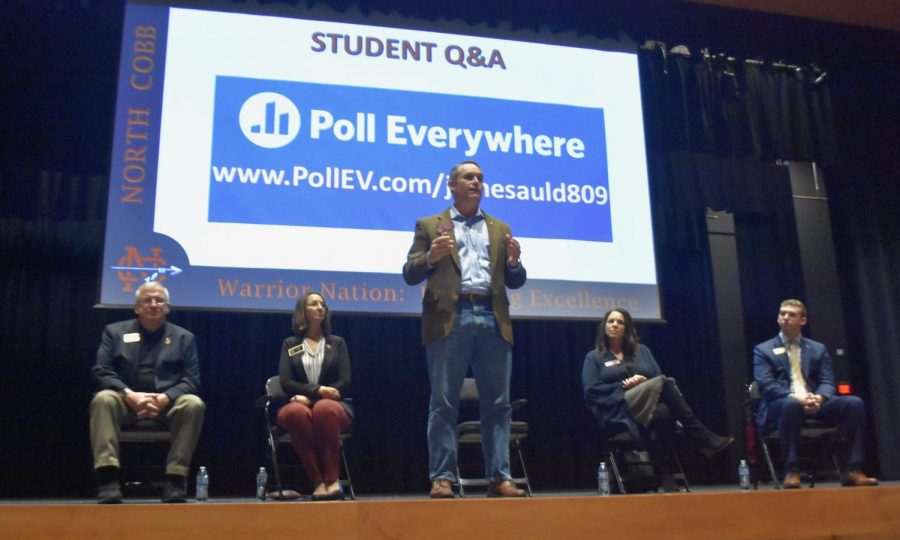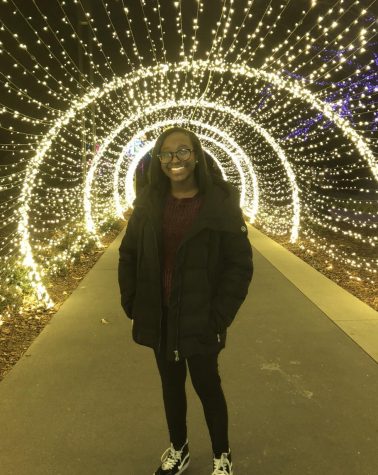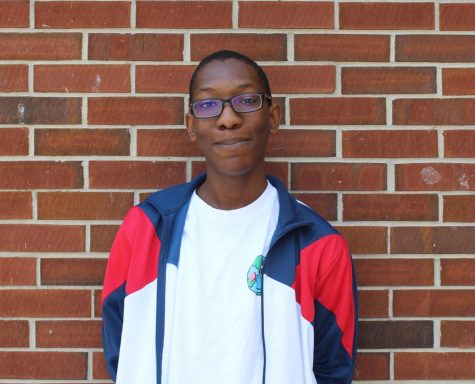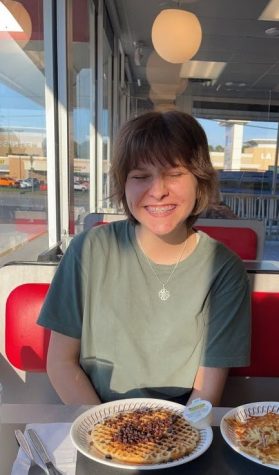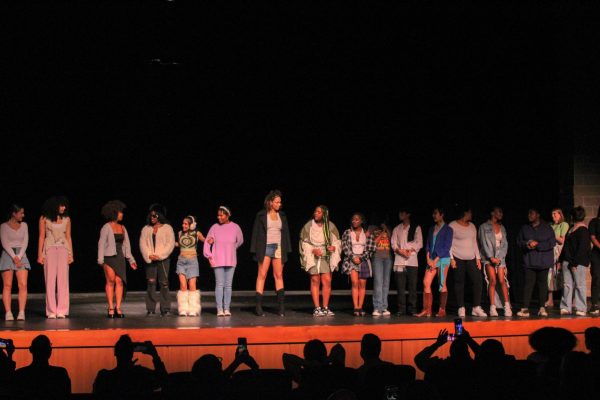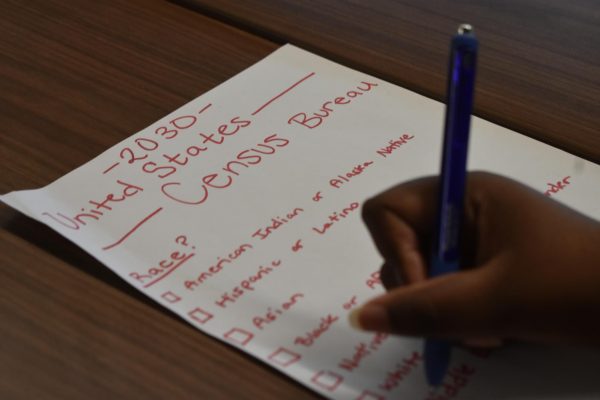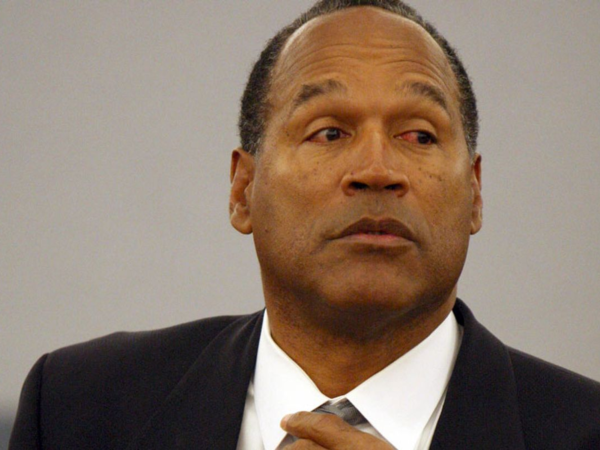Townhall preps NC seniors for future civic engagement
Georgia House Representative Ed Setzler spoke about his role in the local government and important issues concerning students in the Performing Arts Center at NC during a town hall meeting on November 1. Set up by seniors Noemi Carillo and Chandler Quaile and moderated by Magnet Program Coordinator James Auld, all second period government classes spent that period and SPEAR in the hour-long meeting, listening to Setzler and other Georgia representatives, including Randy Scamihorn, Keli Gambrill, Ginny Ehrhart, and field representative for Barry Loudermilk, William Anderson.
November 6, 2019
NC students earned a crash course in voting and politics this past Friday, November 1 during a town hall meeting hosted in the Performing Arts Center. All government and economics classes spent their second period and SPEAR listening to and submitting questions for the five Georgia legislators: Randy Scamihorn, Keli Gambrill, Ed Setzler, Ginny Ehrhart, and field representative for congressman Barry Loudermilk, William Anderson.
The town hall was organized by seniors Chandler Quaile and Noemi Carillo, with Magnet Program Coordinator James Auld as a moderator. First proposed by the NC Politiclub, the event arose due to Carillo, Quaile, and Auld seeing it as a prime opportunity for students to learn more about the increasingly important role of government in their lives, as well as a way to educate them prior to the upcoming county elections on Tuesday, November 4.
“I think that a lack of understanding leads to some complicity, and I think that when you know who your voter base is and you understand who you represent, you do a much better job representing,” Quaile said.
The hall began with the legislators introducing themselves with speeches, sharing what inspired them to become a public servant. They spoke about their professional backgrounds: Scamihorn talked about his interest in politics beginning during his high school years, District 1 Cobb Commissioner Keli Gambrill mentioned the wide array of work she does as County Commissioner, GA District 35 representative Ed Setzler referenced a school board meeting he attended as his gateway to his current career, Ginny Ehrhart, the GA District 36 representative, discussed her experiences with “everyday people” in the state House of Representatives, and Anderson told the crowd of Barry Loudermilk’s important Congressional work.
Next, Mr. Auld opened the floor to questions from students. Students sent their questions to the officials via their devices, using a link posted on the screen. The questions included topics such as social media, student loans, school safety and the HOPE scholarship.
“It’s important for us to be able to meet with them, tell them our thoughts, and ask them questions that are important to us, so that way, when they’re making policies that impact our lives they can know what we want and what is needed for education and lives to be improved,” Carillo said.
The legislators took the time to explain various aspects of local and state government to the students and offered advice on dealing with the challenges they may face in the coming years. When asked a question about the growing issue of student loans, William Anderson advised students to assess their interests and goals before committing to college.
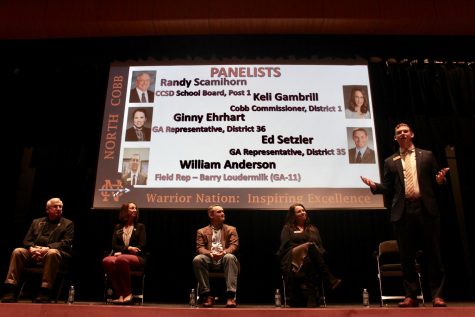
William Anderson spoke on behalf of Congressman Barry Loudermilk, answering questions submitted by students on significant topics such as the legalization of marijuana and possible presidential impeachment. He urged students to consider the long-term effects of both of these issues on the nation’s health and security before forming their opinion. Through his remarks, students saw a different perspective on the topics widely discussed in today’s media.
“College isn’t the only way to advance one’s career,” Anderson said.
Students also voiced their concerns about school safety. According to the K-12 School Shooting Database, 110 mass shootings took place in schools last year alone. Scamihorn reminded students that by preventing threats, schools may lose their appeal.
“As much as we want to make [school] a safe environment, we have a task that we don’t want to make it a prison. [Students] don’t want to have to go through metal detectors and barbed wire fences… We want a conducive learning environment. The number one priority is your safety,” Scamihorn said.
After the hall ended, students gained the opportunity to talk one-on-one with each representative about each issue in-depth or to learn more about them; Anderson and Setzler, in particular, gave students the opportunity of an internship with their respective offices. Both Coach Auld and the Politiclub seniors succeeded in allowing students to really understand the importance of politics.
“When I taught government for years at NC, we never got to go through local and state government: and I found in life that people know almost nothing about their local and state politicians and elected officials, yet in my opinion those people make laws that affect our lives much more than senators, governors, and presidents. So being able to ask questions of and listen to and meet local and state politicians will make them much more informed citizens. And hopefully they’ll vote in those local elections, where voter turnout is usually really low: I think that low voter turnout is because of ignorance, not knowing who they are or what they do and why. So…hopefully they’ll be more inclined to vote,” Auld explained





